The international business landscape is filled with unique practices and cultural differences. Each nation stands out with its own way of doing things. In this connected world, grasping the business practices of the UK and Netherlands is crucial for those wanting to work with these countries. This comparison offers valuable insights into their business cultures.
We’re looking at the UK’s traditional markets against the Netherlands’ focus on innovation and efficiency. Readers will find a rich history, corporate behavior, and social habits of these nations. This story shines a light on their business operations and the societal values behind them.
Key Takeaways
- Gain insight into the core differences and similarities in UK vs Netherlands business practices.
- Understand the significance of cultural factors that shape British and Dutch enterprise.
- Discover how historical trade legacies continue to influence modern business landscapes.
- Explore the impact of cultural comparison across UK and Netherlands commercial activities.
- Uncover the value of context within international business relations and practices.
Introduction to UK and Dutch Business Landscapes
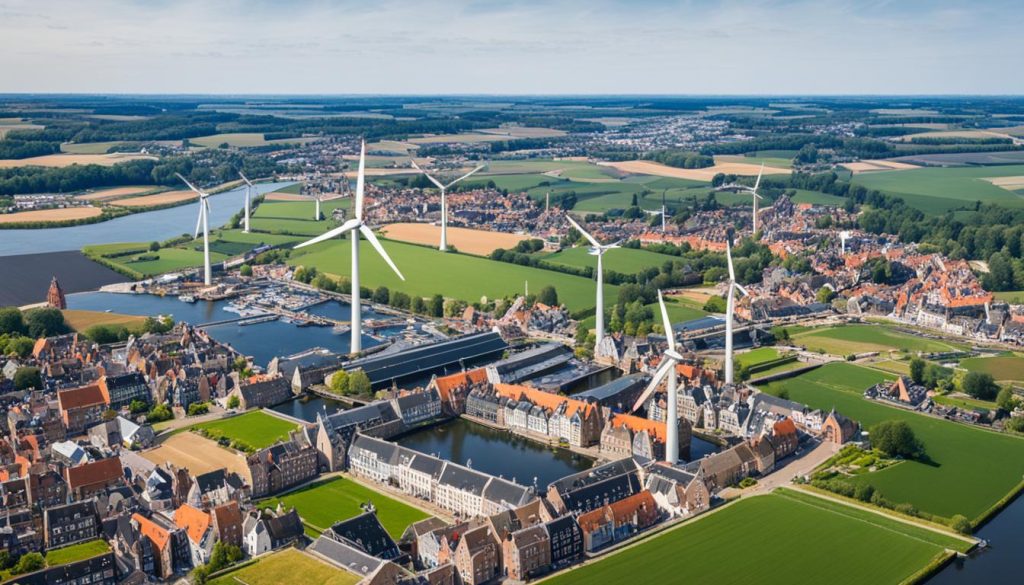
The UK and the Netherlands have strong economies, each unique in its way. This guide highlights the main industries and practices in these countries. It shows how they stand out in the business world.
In the UK, a wide range of industries thrive, with finance at the forefront. London is seen as the world’s financial heart. It leads in banking, insurance, and investments. The rise of fintech start-ups has also played a part in the UK’s economic expansion.
On the other hand, Dutch business is known for international trade and logistics. It also focuses a lot on sustainability and innovation. The Port of Rotterdam and Amsterdam are key to the Netherlands’ role in global trade. They show the country’s openness to foreign investments.
The UK and the Netherlands differ yet contribute to the global market. The UK is a leader in areas like aerospace and pharmaceuticals. Meanwhile, the Dutch agri-food sector is known worldwide.
| Country | Leading Industries | Notes |
|---|---|---|
| United Kingdom | Financial Services, Technology, Manufacturing | Innovative and globally integrated, with a focus on financial and high-tech sectors. |
| Netherlands | Agri-food, Logistics, Renewable Energy | Strong international trade links, with a leading port and a commitment to sustainability. |
The economies of the UK and the Netherlands showcase diverse business models in Europe. The UK excels with its strength in finance and tech. The Netherlands shines in trade, sustainability, and the agri-food industry.
Historical Influences on UK and Netherlands Commercial Practices
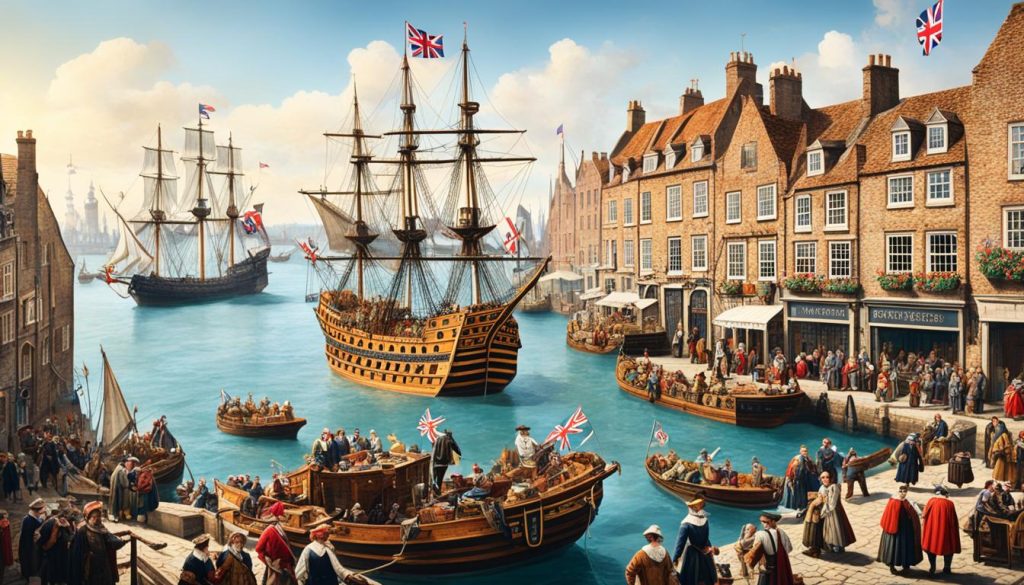
Exploring commerce in the United Kingdom and the Netherlands shows their rich history. Their trade practices are shaped by their past of global reach. The Historical UK trade and Dutch colonial commerce laid the foundations of modern market strategies and business thoughts.
Vestiges of British Imperial Trade
The British Imperial influence has deeply affected UK business operations. The empire built extensive trade routes and transport systems. These are key to the UK’s infrastructure today. Moreover, the history of sea dominance has fostered an innovative and enterprising culture in Britain.
Legacy of the Dutch Golden Age
The Dutch Golden Age impact is still felt in the Netherlands’ commerce. It brings a spirit of risk-taking and an open trade policy from the Dutch East India Company’s time. The Netherlands became a leader in trade freedom and financial creativity, which continues in today’s business strategies and deregulated markets.
These historical influences have shaped the economic and global identity of both nations. They blend history with current commercial practices. This mix enriches our understanding of their cultures and economies, affecting international trade and relationships.
Corporate Governance and Management Styles
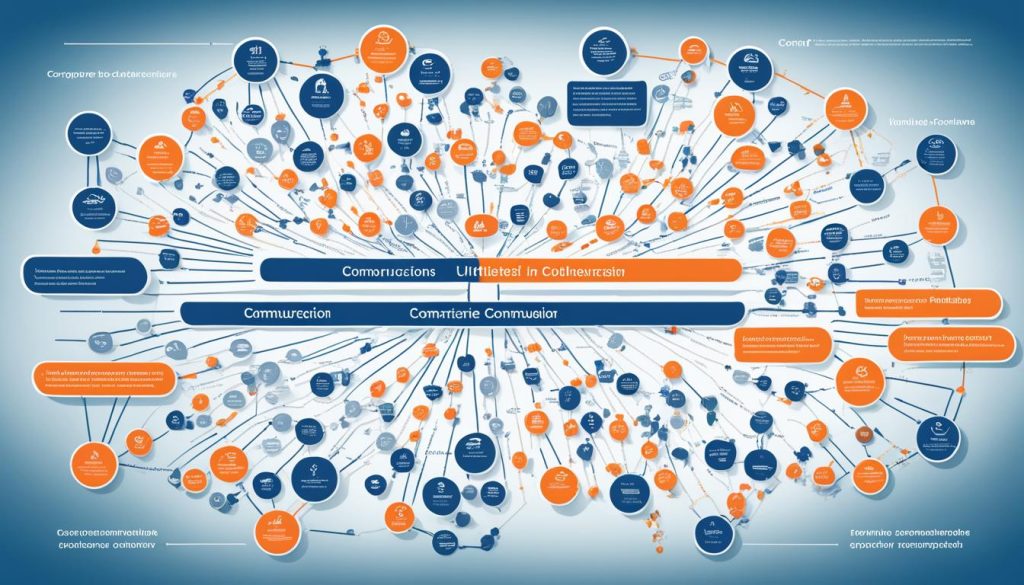
Getting to grips with corporate governance and management styles in the UK and the Netherlands is crucial. These countries have deep business roots. Their UK management practices and Dutch governance structures show unique leadership and business behaviour.
In the UK, businesses often have a clear chain of command. This set-up is seen as traditional British—respectful but bold, with a focus on rules and order.
On the other hand, the Netherlands prefers equal footing in management. It’s all about teamwork and bringing everyone into decisions. This style makes for a very open way of running a business, where everyone’s voice matters.
Below is a comparison of business leadership in the UK versus the Netherlands. It gives insight into their managerial practices:
| Aspect | UK Management Practices | Dutch Governance Structures |
|---|---|---|
| Leadership Hierarchy | Defined and Vertical | Flat and Horizontal |
| Decision-Making | Top-Down Approach | Consensual and Collaborative |
| Employee Engagement | Formal and Structured | Open and Informal |
| Corporate Responsibility | Responsibility to Shareholders | Broader Stakeholder Consideration |
These differences really do affect real-world business. The UK often prioritises profit and shareholder interests. But the Netherlands looks towards sustainability and societal benefits.
This shows in how they operate inside and out. It affects things like investments, customer trust, and partnerships across borders.
Understanding these differences is key for businesses aiming to grow globally. It helps them adapt and flourish in the world market.
Workplace Culture in the UK vs. Netherlands

The workplace culture shows clear differences when we compare the British work culture to Dutch employment practices. The UK sticks to its traditions, making its work environment more formal. In contrast, the Netherlands welcomes new ideas on work-life balance and inclusivity. These approaches change how professionals view work.
Work-Life Balance Practices
The Netherlands leaps ahead with its modern work-life balance practices, valuing personal time highly. It encourages flexible hours and part-time work more than the UK does. This commitment to life quality sets Dutch practices apart.
Approach to Hierarchies and Decision Making
When it comes to business hierarchy, the UK and the Netherlands take different paths. The UK is more traditional, letting ranks impact meetings and decisions. On the flip side, the Netherlands prefers a flat structure. This encourages open talks at all levels, making decisions together. It’s seen as fairer and more open.
This difference in how offices look and feel in both countries can be captured in one image:
When we look closely, many aspects of these work cultures invite comparison.
| Aspect of Culture | British Work Culture | Dutch Employment Practices |
|---|---|---|
| Flexibility in Work Hours | More structured schedules, with a growing emphasis on flexible working due to modern trends | High level of flexibility, with a strong emphasis on part-time work and work-from-home options |
| Hierarchical Dynamics | Clearly defined ranks and a respect for established hierarchies | Preference for flat structures, promoting egalitarian interaction among staff |
| Decision-Making Style | Tends towards top-down decisions, with input from executives carrying significant weight | Consensual approach, with a broad-based discussion across all levels leading to collective decisions |
Seeing these work cultures side by side gives us deep insights. It shows how cultural background shapes employees’ experiences in the UK and the Netherlands.
Business Communication Etiquette: UK vs. Netherlands
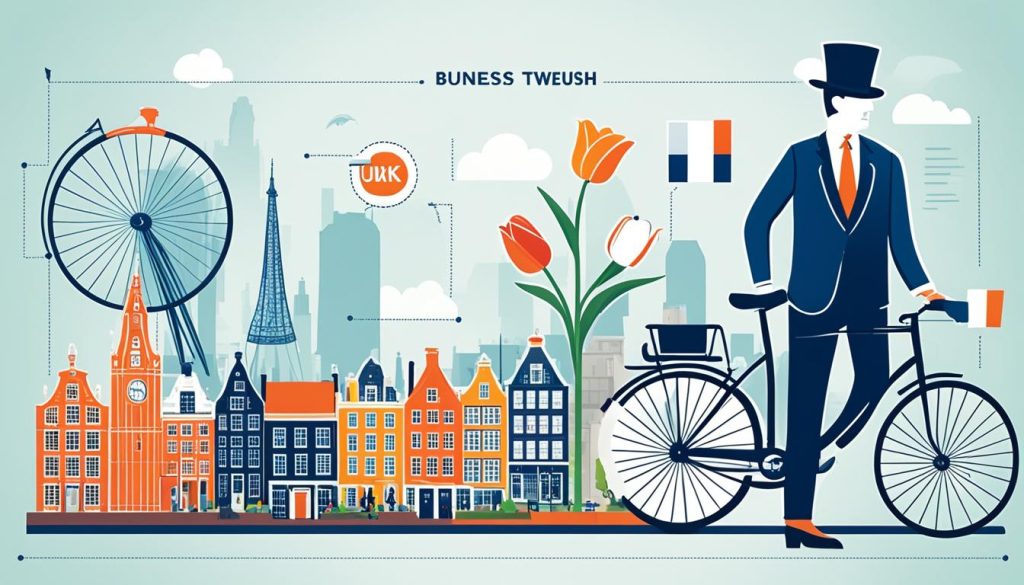
In the world of work, understanding the way people communicate in different places is key. This is especially true when we look at how people in the UK talk about business compared to the Netherlands. In the UK, the approach is more formal. However, in the Netherlands, people prefer to be direct and informal.
In the UK, business talks are formal and cautious. Emails, meetings, and even chats in the office follow this rule. It’s best to stick with formality until you get to know someone better.
On the other hand, the Netherlands values being clear and straightforward. Their way of doing business might seem informal but it shows no disrespect. It’s all about being efficient and open to new ideas, even if you’re talking to the boss.
- The Importance of Context: In the UK, the setting of a chat can change how it goes. People try to find a middle ground between being subtle and straightforward. Meanwhile, the Dutch are always upfront, no matter the situation.
- Role of Hierarchies: In the UK, your position at work affects how you communicate. Higher ranks mean more formality. But in the Netherlands, everyone has an equal say, thanks to less rigid work hierarchies.
- Meeting Etiquette: British meetings stick to a set plan and rules. Dutch meetings welcome on-the-spot talks and are more flexible.
| Aspect | UK Corporate Communication | Netherlands Business Dialogue |
|---|---|---|
| Formality | High; use formal titles and surnames | Low; first names are commonly used after initial introductions |
| Approach | Cautious, with a focus on politeness | Direct and to the point |
| Email Communication | Structured with formal greetings and closings | Brief, often skipping the salutations and sign-offs |
| Decision Making | Often top-down, seeking higher approval | Consensus-based, involving discussion amongst all levels |
Understanding the formal versus informal ways of business talk is crucial for working internationally. Knowing the differences between UK and Dutch styles helps in creating strong work relationships across countries.
Compare Business and culture between United Kingdom and Netherlands
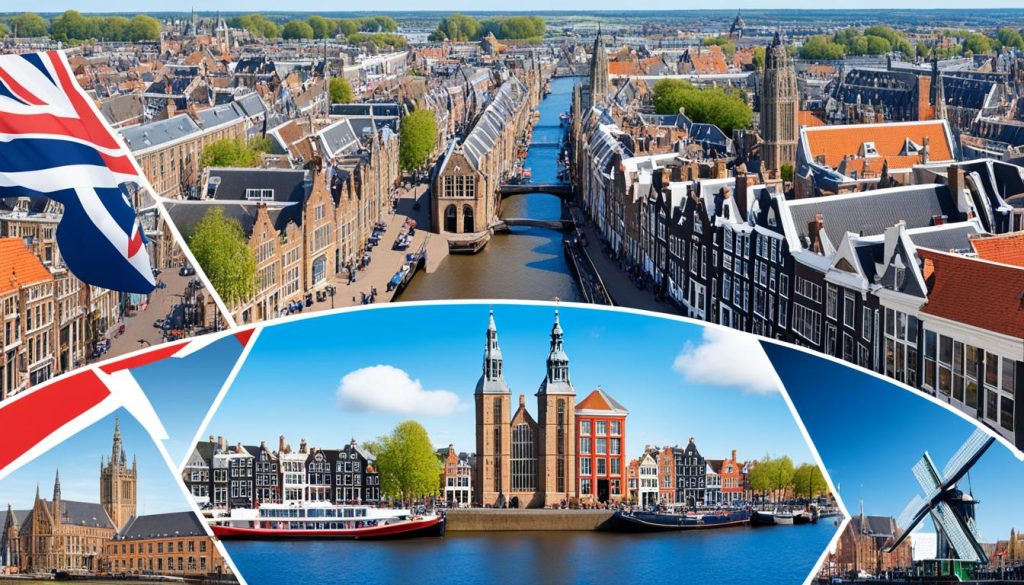
Starting a business in a new market is both thrilling and tough. It’s critical to grasp the UK’s market entry complexities and Dutch business rules for successful international trade. The UK and the Netherlands have different rules and strategies. This makes careful planning essential for cross-border business.
Assessing Market Entry Strategies
Breaking into the UK market involves tackling competition, legal issues, and cultural gaps. Companies might need to set up a local branch or team up with others, crafting strategies that meet the UK’s specific challenges. In the Netherlands, the scenario shifts, calling for local collaborations and in-depth knowledge of Dutch trade practices.
- Analysis of market size and consumer behaviours
- Evaluation of distribution and supply chain networks
- Identification and mitigation of legal and financial risks
Understanding Regulatory Differences
Following local laws is crucial in business. The UK boasts a complex legal system with unique tax and employment laws. Meanwhile, Dutch regulations, shaped by EU rules, present a different picture. A deep dive into each region’s legal framework is key to managing Dutch rules and entering the UK market successfully.
| Aspect | United Kingdom | Netherlands |
|---|---|---|
| Business Registration | Companies House registration, Corporation Tax | Chamber of Commerce registration, VAT declaration |
| Labor Laws | Stringent employment contracts, employee rights protection | Flexible working arrangements, emphasis on employee well-being |
| Corporate Taxation | Varies by region, with incentives for specific sectors | Competitive rates within the EU, innovation-friendly policies |
| Import/Export Tariffs | Post-Brexit trade agreements, customs declarations | EU Customs Union, seamless intra-EU trade |
Innovation and Entrepreneurship: A Cross-Cultural Examination
Exploring innovation and entrepreneurship highlights the unique aspects of UK and Dutch markets. London and Amsterdam are crucial for creative thinkers. Their start-up support systems are keys to their global recognition.
Start-Up Ecosystems: London and Amsterdam
London’s start-up environment is alive with new tech and creative ideas. It draws investors with its supportive infrastructure. Silicon Roundabout and various office spaces offer fertile grounds for new ventures.
In Amsterdam, business incubators foster start-up growth. They embody Dutch entrepreneurship’s collaborative spirit. Amsterdam’s diverse talent and central location draw tech start-ups.
These cities provide not just space but a digital community for idea sharing. This helps entrepreneurs fit into the market and connect globally.
Government Support for Innovators
-
In the UK, Innovate UK and the British Business Bank support innovators with funds and advice. They help turn ideas into successes.
-
In the Netherlands, the RVO aids Dutch entrepreneurs with funding and networking. They promote sustainable growth and international business chances.
Both countries promote a culture that supports innovation. They understand support for startups benefits the wider economy, not just the businesses.
The UK and the Netherlands are committed to entrepreneurship. Sharing best practices strengthens the global start-up scene.
Comparative Analysis of UK and Dutch Industries

A look at UK and Netherlands industries shows interesting differences and connections. The UK is well-known for its financial services, with a history that makes the City of London a world-leading financial center. Meanwhile, the Netherlands is famous for its expertise in water management and agriculture. This makes it a leading exporter of farm goods, despite its small size.
Both areas are driven by technology, but in their own ways. The UK leads in fintech and AI innovations. The Dutch are ahead in agritech and sustainable energy. Below, we’ve outlined these sectors to compare UK and Netherlands industries, highlighting trends and future challenges.
| Industry | United Kingdom | Netherlands |
|---|---|---|
| Financial Services | London dominates in global trade, insurance, and banking services. Brexit brings challenges but also new global partnership opportunities. | Amsterdam is rising as a finance hub in Europe, attracting financial firms after Brexit. The sector grows with strong rules and tech use. |
| Agriculture | The UK focuses on modern, sustainable farming. Brexit-related trade deals may impact market access and incomes. | Dutch agriculture leads in innovation and exports dairy, vegetables, and flowers. It faces environmental and land-use rules. |
| Technology | The UK’s tech scene is booming, driven by places like Silicon Roundabout. Yet, there’s a shortage of skilled workers. | The Netherlands shines in high-tech and start-ups. It leads in tech exports and R&D but faces growing European competition. |
| Energy | The UK is diversifying into oil, gas, nuclear, and renewables, moving towards green energy policies. | The Netherlands leads in wind and solar energy. It aims to move away from natural gas. |
The UK and the Netherlands face global market challenges while innovating in their fields. Comparing these industries shows their strengths, challenges, and opportunities for learning and collaboration. This is especially true in green energy and digital transformation, where they share common goals.
In a changing world economy, UK and Dutch industries prove the power of adaptation and leadership. This analysis highlights the resilience and growth potential of these economies, rooted in history and current achievements.
Trade Relations and Economic Partnerships
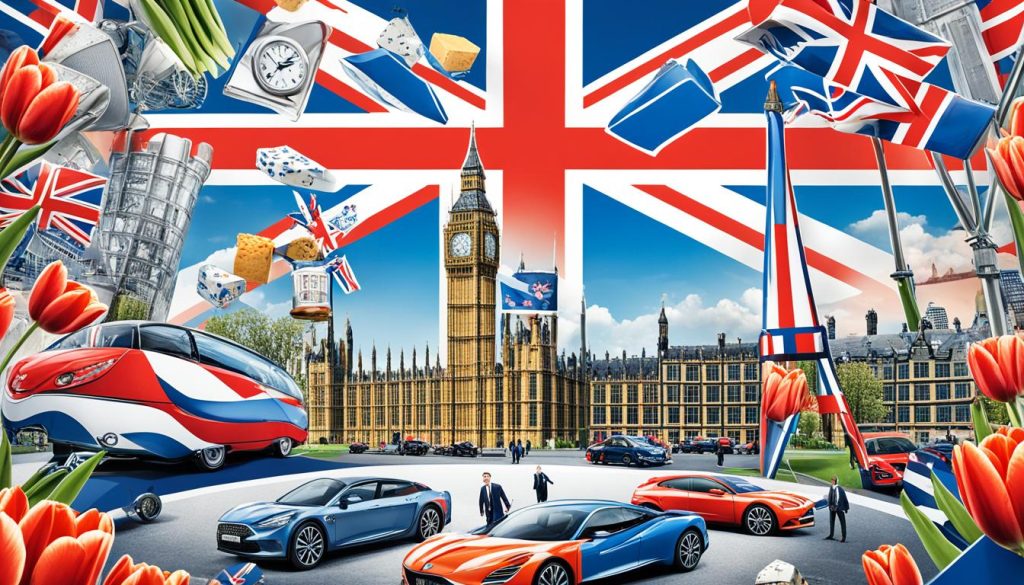
The United Kingdom and the Netherlands are rethinking their trade ties after Brexit. They’re adapting to new EU trade rules and looking at their bilateral agreements. This situation brings both new chances and challenges in international trade.
Impact of Brexit on UK-Netherlands Trade
Brexit has created trade barriers that didn’t exist before between the UK and the Netherlands. Now, tariffs and customs checks slow down the movement of goods. Initially, trade between the two nations dropped as everyone tried to understand the new rules.
But, there’s a silver lining. Both countries have the opportunity to make new trade agreements. This could make trading easier and benefit both their economies.
Role of the EU in Shaping Dutch Trade Policies
The Netherlands still follows the EU’s trade policies. This means they are part of a big market but also have to adjust to a post-Brexit relationship with the UK. The EU’s terms now guide their trade with the UK.
This situation has its ups and downs for the Dutch. It offers them a strong support network and a huge market. Yet, it also presents challenges because of the new dynamics with the UK.
Consumer Behaviour and Marketing Strategies
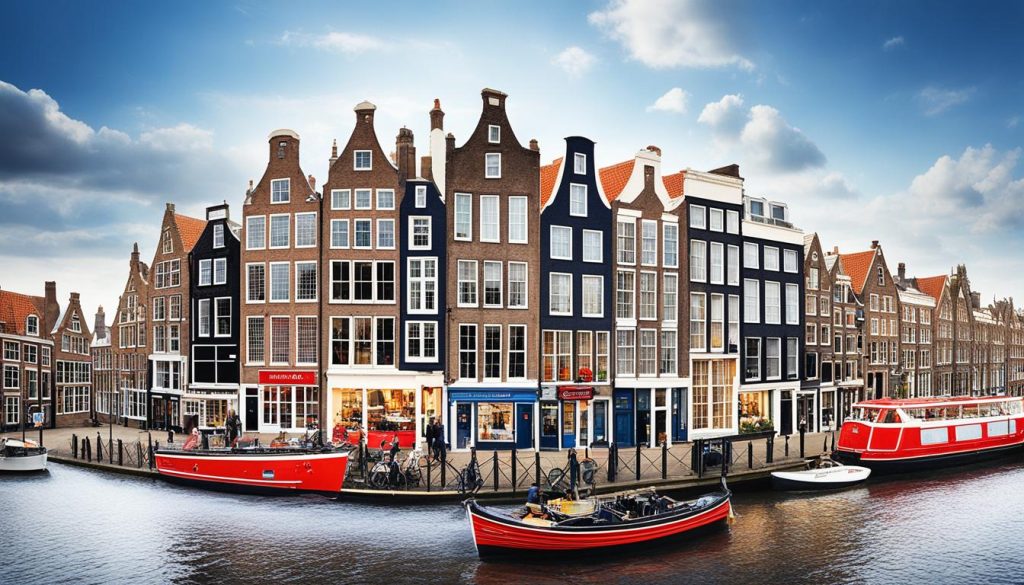
It’s crucial to grasp UK and Dutch consumer trends for effective marketing. Tailoring marketing efforts to fit local tastes ensures success. This piece explores adapting marketing methods between the UK and the Netherlands.
UK shoppers value quality and will pay more for superior products. Dutch shoppers, however, look for good deals and practical buys. Companies thus adopt different strategies for each market.
- UK brands often focus on loyalty programmes and personalised marketing to build and maintain relationships with consumers.
- Conversely, in the Netherlands, transparency in pricing and sustainability practices plays a larger role in influencing purchasing decisions.
We can learn much by comparing consumer preferences in these areas. This knowledge helps businesses fine-tune their marketing for better outcomes.
| Consumer Attribute | UK | Netherlands |
|---|---|---|
| Brand Loyalty | High | Moderate |
| Importance of Sustainability | Growing | Significant |
| Value for Money | Important, with a premium preference | Essential, with a frugal mindset |
| Marketing Focus | Personalisation and quality | Transparency and sustainability |
| Online Shopping Growth | Steady increase | Rapid adoption |
Online shopping is booming in both regions, changing sales patterns. This demands digital marketing strategies that ensure a smooth shopping experience.
“Tailoring marketing strategies to suit local consumer behaviours is not just recommended; it is essential for brand growth and longevity within these markets.”
With ongoing shifts in UK and Dutch consumer habits, marketers need to keep evolving their strategies. Staying relevant requires a deep understanding of market specifics, whether online or offline.
Cultural Norms and Social Etiquette in Business
International trade requires more than just financial know-how. It needs an understanding of cultural differences too. When looking at business etiquette in the UK and Dutch social norms in enterprise, we find important unspoken rules. These can be as key as any legal agreement. We explore everything from networking to setting up business ties, considering British politeness and Dutch openness.
Networking and Relationship Building
In the UK, making business connections is seen as an art. It’s all about being subtle and patient. The British believe trust grows slowly, like a plant needing care. In contrast, the Dutch value being real and direct when networking. Their business talks are straight to the point, focusing on what both parties expect.
Importance of Social Customs in Business Transactions
Social customs play a big part in making deals. Both British and Dutch value being on time and ready, showing respect. In the UK, being polite and a bit reserved is common, with humour often easing tension. Dutch business scenes, however, favour an equal conversation style. Speaking plainly is expected, which may surprise some.
Knowing these social rules is crucial for good international partnerships. In both the UK and Netherlands, every action from handshakes to prompt replies shows deep respect for the cultural values of business partners.
Education and Workforce Development
The UK and the Netherlands follow different paths in education and job training. In the UK, education focuses on higher learning. Universities like Oxford and Cambridge are famous worldwide. They create a workforce that is versatile and skilled.
This approach supports career growth in the UK, blending strong education with real-world experience. Meanwhile, in the Netherlands, vocational training is highly valued. It ties directly to their job market, making students ready for work right after they finish their studies.
Their system combines classroom learning with hands-on training. This creates workers who can easily handle today’s business challenges. Both methods stress the need for ongoing learning in business. This is crucial in our fast-changing work world.
The UK and the Netherlands aim to prepare professionals for a varied and competitive global market. Their focus on education and training doesn’t just help individuals grow. It also strengthens the business capabilities of their countries.







